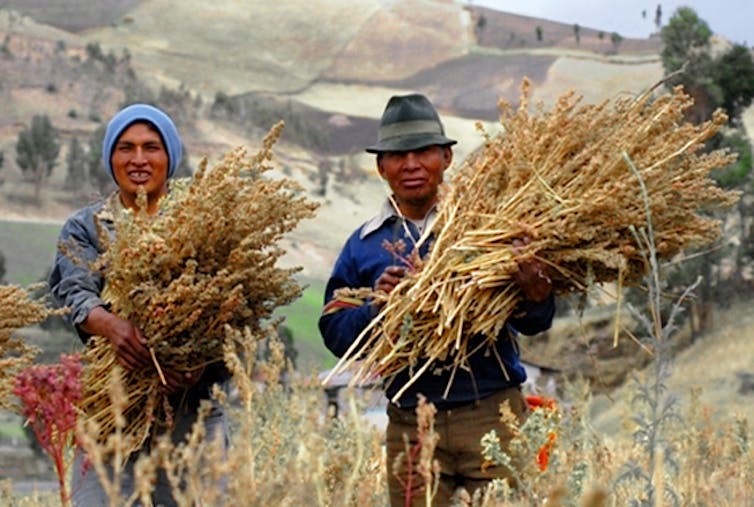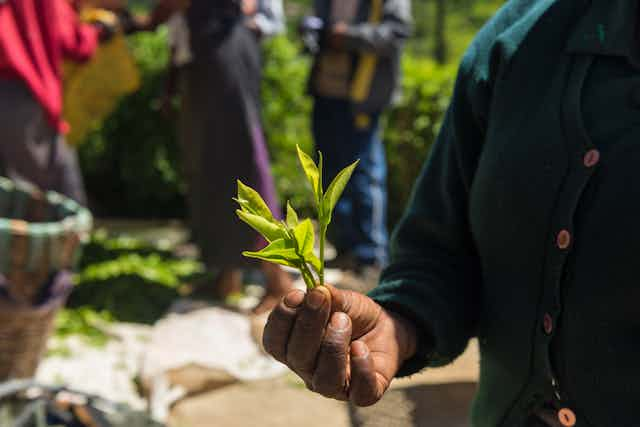Paradoxically, of the one billion people classified as food insecure by the United Nations, about 500 million are smallholder farmers in developing economies. Some of these producers are exporting luxuries such as coffee, cocoa, exotic fruits and sugar for consumers in developed economies. Due to poor and volatile prices coupled with unfair trade rules, they simply don’t earn enough to feed their families all year round and often experience the problem of seasonal hunger between harvests.
This lack of nourishment can lead to stunting, weakened immune systems and more vulnerability to disease and infection. Children are particularly vulnerable, as periods of under-nutrition can hinder both their physical and mental development. Seasonal hunger is a serious problem for many coffee and cocoa farmers. Smallholder coffee farmers in three Central American countries were found to have no guarantee of food security for three to four months every year.
Fairtrade was set up initially to work with marginalised smallholder farmers as a “a trading partnership, based on dialogue, transparency and respect that seeks greater equity in international trade”.
Sales of Fairtrade products have grown to €7.3 billion (£6.3 billion) working with 1,230 producer organisations consisting of 1.6m farmers. Fairtrade certification actively supports producers in developing countries through importing and retailing their products. Moreover, acting as a social movement, fair trade campaigns for changes in the conventional terms and conditions of international trade which disadvantage producers in developing economies.
The movement prioritises socioeconomic factors by working to facilitate market access for producers, paying producers a fair minimum price which provides producers a guaranteed price when the world market price falls below this level. The stability of the Fairtrade minimum price means that producer cooperatives may be able to obtain finances and credit services. Cooperatives also gain security from longer-term contracts with exporters through the Fairtrade market.
Social premium
In addition, whatever the conventional market price, producers in the Fairtrade system are also paid a social premium per tonne of produce (for cocoa it is US$200 per tonne) which is used for community infrastructure projects such as crop diversification schemes to combine cash and food crops, building schools, water provision and health services.
Jane Sepkazi, 36, a member of the Sireet OEP tea co-operative in Kenya, is one of the farmers who have been trained by their Fairtrade partners to grow different crops as part of her organisation’s plan to increase food security for farmers. The idea is to make farmers less reliant on tea for their income and offer ways to use their land to produce food. Sepkazi lives on her 0.2-hectare farm with her parents and two children and as well as tea, she has chickens and a kitchen garden. “I’ve been taught poultry keeping so I don’t rely just on my tea crop,” she said.
The impact of Fairtrade is significant. A study by the Center for Evaluation at Saarland University in Germany found that smallholder farmers who benefited from Fairtrade enjoyed higher and more stable incomes than producers in the respective comparison groups. A further study involving coffee farmers in Uganda showed that participation in Fairtrade increased household living standards by 30% and significantly reduced the prevalence and depth of poverty.
Banana farmer Julio Mercado Cantillo, 57, lives on his farm in Macondo, Colombia, with his wife Alicia, children and grandchildren. For Cantillo, one of the benefits of Fairtrade has been better and more stable prices for his bananas, which has improved his income and the food security of his family. Cantillo explains:
When we began growing bananas, it was tough. There were some days when we only had one meal. Since we joined Fairtrade, everything has changed. We now have all of our daily meals and we have also managed from the extra income from Fairtrade to buy farm animals which provides an extra source of food, and the opportunity to bring in more income by selling the animals.

Nicaragua is the second poorest country in Latin America after Haiti and during the “thin season” before the coffee harvest, farmers in central Nicaragua often rely on food programmes to feed their children. To tackle this, the COOMPROCOM coffee cooperative has invested its Fairtrade Premium income in programmes that focus on food and nutritional security in the community. These include setting up a revolving fund that allows farmers to access quick loans to make emergency purchases of food. Another is a programme focusing on child nutrition that encourages farmers to grow food crops (such as beans, rice, tomatoes and corn) and diversify diets so that they are less reliant on food purchases.
Growing network
To help tackle the problem of seasonal hunger, the Fairtrade movement has also given birth to some very interesting financial institutions such as Shared Interest, Oikocredit and Cordiad which provide social finance for innovative trade mechanisms for smallholder farmer groups such as pre-finance for individual orders, credits and loans for stock facilities and pre-harvest loans when cash flow is a major problem for producers.
Being part of the Fairtrade system provides a very useful safety net for smallholder farmers, but it can’t do everything in isolation. Fairtrade works best when it operates as part of a bigger system – within a framework of collaboration backed by supportive policy at national and local level and coupled with meaningful commitments from business.
There is still much work to be done to continue the positive impact of Fairtrade – the movement needs to keep the pressure on both policy makers and business leaders to ensure consumers can choose Fairtrade at the point of purchase. In the UK, Fairtrade companies are having to fight hard to maintain their position on the supermarket shelf – and the movement needs to redouble its efforts to communicate with consumers to explain how their purchase of Fairtrade goods can help people like Sepkazi and the Cantillo family keep their heads above water even when times are tough.
_This article is part of a series by The Conversation on food security. Read other articles here.

